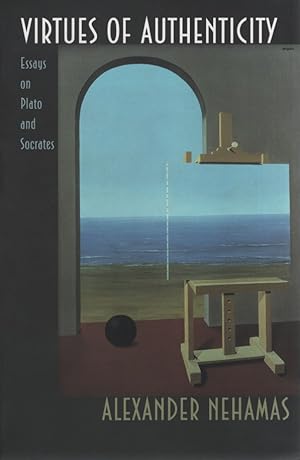9780691001784 - Virtues of Authenticity: Essays on Plato and Socrates von Nehamas, Alexander (1 Ergebnisse)
Produktart
- Alle Produktarten
- Bücher (1)
- Magazine & Zeitschriften
- Comics
- Noten
- Kunst, Grafik & Poster
- Fotografien
- Karten
-
Manuskripte &
Papierantiquitäten
Zustand
- Alle
- Neu
- Antiquarisch/Gebraucht
Einband
- alle Einbände
- Hardcover
- Softcover
Weitere Eigenschaften
- Erstausgabe
- Signiert
- Schutzumschlag
- Angebotsfoto
Land des Verkäufers
Verkäuferbewertung
-
Virtues of Authenticity: Essays on Plato and Socrates.
Verlag: Princeton University Press, 1999
ISBN 10: 0691001782ISBN 13: 9780691001784
Anbieter: Fundus-Online GbR Borkert Schwarz Zerfaß, Berlin, Deutschland
Buch
Paperback. Zustand: Gut. XXXVI, 372 p. Aus der Bibliothek von Prof. Wolfgang Haase, langjährigem Herausgeber der ANRW und des International Journal of the Classical Tradition (IJCT) / From the library of Prof. Wolfgang Haase, long-time editor of ANRW and the International Journal of the Classical Tradition (IJCT). - Einband berieben, Kopfschnitt leicht angeschmutzt, sonst sehr guter Zustand / binding rubbed, top edge slightly soiled, otherwise very good condition. - The eminent philosopher and classical scholar Alexander Nehamas presents here a collection of his most important essays on Plato and Socrates. The papers are unified in theme by the idea that Plato s central philosophical concern in metaphysics, ethics, and aesthetics was to distinguish the authentic from the fake, the original from its imitations. In approach, the collection displays Nehamas s characteristic combination of analytical rigor and sensitivity to the literary form and dramatic effect of Plato s work. Together, the papers represent Nehamas s distinct and original contributions to scholarship on Plato and Socrates and serve as a comprehensive introduction to the thought of these two philosophers. In the book s opening section, Nehamas discusses Plato s representation of Socrates as a model of authentic human goodness, showing that Plato s Socrates is a more skeptical, troubling, and individualistic thinker than is usually supposed. The papers in the second section form a sustained defense of a new and important understanding of Plato s theory of the forms and the evolution of that theory in Plato s later writings. The third section examines Plato s contention that popular entertainment by which he meant Greek epic and tragic poetry misleads its audience into a debased life, an argument Nehamas relates to modern anxieties about television and other forms of popular culture. The collection also includes a discussion of Plato s use of the dialogue form in his representation of Socrates and carefully examines the combination of literary and philosophical elements in his work. Nehamas argues in the book that Plato s specific judgments of what is authentic are often flawed, but that his idea of authenticity as the mark of truth, beauty, and goodness is stronger than many modern scholars have assumed. In drawing together Nehamas s many influential ideas about Plato and Socrates, Virtues of Authenticity is a major contribution to the study of ancient Greek philosophy. / CONTENTS Acknowledgments List of Abbreviations Introduction I. Socrates: Questions of Goodness and Method One Meno s Paradox and Socrates as a Teacher Two Socratic Intellectualism Three What Did Socrates Teach and to Whom Did He Teach It? Four Voices of Silence: On Gregory Vlastos s Socrates Five Eristic, Antilogic, Sophistic, Dialectic: Plato s Demarcation of Philosophy from Sophistry II. Plato: Questions of Metaphysics and Epistemology Six On Parmenides Three Ways of Inquiry Seven Plato on the Imperfection of the Sensible World Eight Confusing Universals and Particulars in Plato s Early Dialogues Nine Self-Predication and Plato s Theory of Forms Ten Participation and Predication in Plato s Later Thought Eleven Episteme and Logos in Plato s Later Thought III. Pluto: Questions of Beauty and the Arts Twelve Plato on Imitation and Poetry in Republic X Thirteen Plato and the Mass Media IV Plato: Individual Works Fourteen The Symposium Fifteen The Republic Sixteen The Phaedrus Index of Passages Cited General Index. ISBN 9780691001784 Sprache: Englisch Gewicht in Gramm: 563.


